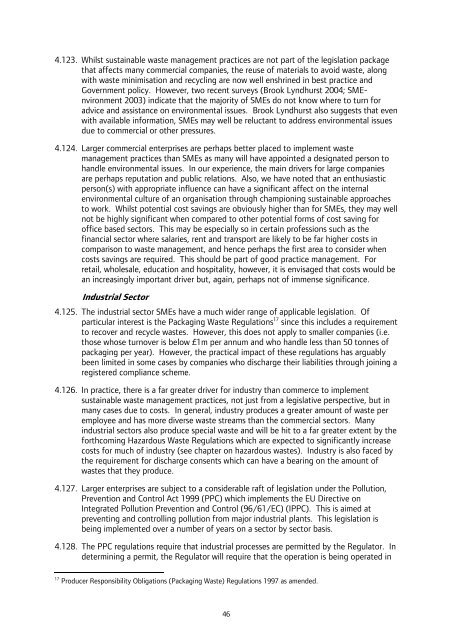London Wider Waste Strategy - London - Greater London Authority
London Wider Waste Strategy - London - Greater London Authority
London Wider Waste Strategy - London - Greater London Authority
You also want an ePaper? Increase the reach of your titles
YUMPU automatically turns print PDFs into web optimized ePapers that Google loves.
4.123. Whilst sustainable waste management practices are not part of the legislation package<br />
that affects many commercial companies, the reuse of materials to avoid waste, along<br />
with waste minimisation and recycling are now well enshrined in best practice and<br />
Government policy. However, two recent surveys (Brook Lyndhurst 2004; SMEnvironment<br />
2003) indicate that the majority of SMEs do not know where to turn for<br />
advice and assistance on environmental issues. Brook Lyndhurst also suggests that even<br />
with available information, SMEs may well be reluctant to address environmental issues<br />
due to commercial or other pressures.<br />
4.124. Larger commercial enterprises are perhaps better placed to implement waste<br />
management practices than SMEs as many will have appointed a designated person to<br />
handle environmental issues. In our experience, the main drivers for large companies<br />
are perhaps reputation and public relations. Also, we have noted that an enthusiastic<br />
person(s) with appropriate influence can have a significant affect on the internal<br />
environmental culture of an organisation through championing sustainable approaches<br />
to work. Whilst potential cost savings are obviously higher than for SMEs, they may well<br />
not be highly significant when compared to other potential forms of cost saving for<br />
office based sectors. This may be especially so in certain professions such as the<br />
financial sector where salaries, rent and transport are likely to be far higher costs in<br />
comparison to waste management, and hence perhaps the first area to consider when<br />
costs savings are required. This should be part of good practice management. For<br />
retail, wholesale, education and hospitality, however, it is envisaged that costs would be<br />
an increasingly important driver but, again, perhaps not of immense significance.<br />
Industrial Sector<br />
4.125. The industrial sector SMEs have a much wider range of applicable legislation. Of<br />
particular interest is the Packaging <strong>Waste</strong> Regulations 17 since this includes a requirement<br />
to recover and recycle wastes. However, this does not apply to smaller companies (i.e.<br />
those whose turnover is below £1m per annum and who handle less than 50 tonnes of<br />
packaging per year). However, the practical impact of these regulations has arguably<br />
been limited in some cases by companies who discharge their liabilities through joining a<br />
registered compliance scheme.<br />
4.126. In practice, there is a far greater driver for industry than commerce to implement<br />
sustainable waste management practices, not just from a legislative perspective, but in<br />
many cases due to costs. In general, industry produces a greater amount of waste per<br />
employee and has more diverse waste streams than the commercial sectors. Many<br />
industrial sectors also produce special waste and will be hit to a far greater extent by the<br />
forthcoming Hazardous <strong>Waste</strong> Regulations which are expected to significantly increase<br />
costs for much of industry (see chapter on hazardous wastes). Industry is also faced by<br />
the requirement for discharge consents which can have a bearing on the amount of<br />
wastes that they produce.<br />
4.127. Larger enterprises are subject to a considerable raft of legislation under the Pollution,<br />
Prevention and Control Act 1999 (PPC) which implements the EU Directive on<br />
Integrated Pollution Prevention and Control (96/61/EC) (IPPC). This is aimed at<br />
preventing and controlling pollution from major industrial plants. This legislation is<br />
being implemented over a number of years on a sector by sector basis.<br />
4.128. The PPC regulations require that industrial processes are permitted by the Regulator. In<br />
determining a permit, the Regulator will require that the operation is being operated in<br />
17 Producer Responsibility Obligations (Packaging <strong>Waste</strong>) Regulations 1997 as amended.<br />
46
















